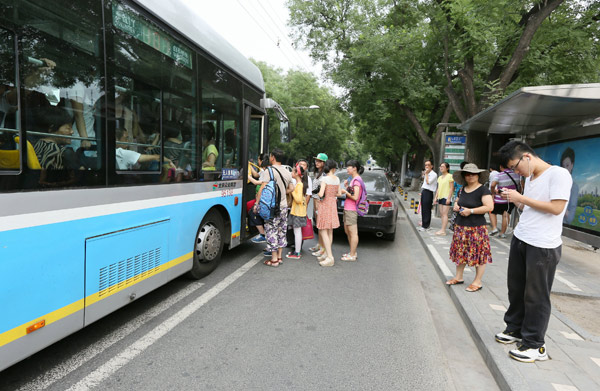 Chinese Air Force's combat group organizes actual-combat training
Chinese Air Force's combat group organizes actual-combat training Street fitness instructor
Street fitness instructor
 Couples from 56 ethnic groups create new Guinness record of proposal
Couples from 56 ethnic groups create new Guinness record of proposal
 Pakistan celebrates Independence Day
Pakistan celebrates Independence Day
 Collective wedding ceremony for 'Beijing drifters’ held in Happy Valley
Collective wedding ceremony for 'Beijing drifters’ held in Happy Valley
 An antique camera collector in Tianjin
An antique camera collector in Tianjin
 Protests held in Gaza, Jordan to support Egyptian people
Protests held in Gaza, Jordan to support Egyptian people
 China Beijing Int'l Gifts, Premium&Houseware Exhibition opens
China Beijing Int'l Gifts, Premium&Houseware Exhibition opens
 Joey Yung's new album cover released
Joey Yung's new album cover released
 |
| Parking in inappropriate places, such as bus lanes, often results in traffic jams in downtown Beijing. Provided to China Daily |
Coordinating authority
Zhu Tao, a lecturer at the school of sociology at Beijing University of Technology, said an overall coordinating authority should be established to tackle the capital's parking problems.
"There's a lack of focused management, and governance is weak. The municipal government should think about giving power to a parking authority that could handle all the issues such as planning, building and pricing the lots, plus regulating and managing all the facilities and their use," he said. Zhu suggested that the city government could learn from the experiences of other large cities, both in China and overseas.
Shanghai, one of China's largest municipalities, is also exploring developments in the field of parking.
By June 2012, the city had 389,000 parking lots, providing space for 80 million cars annually, according to Zhou Huai, deputy director of the Shanghai Transportation and Harbor Administration at a media briefing held by the local government.
To improve the efficiency of public parking lots, the city has set up 267 information boards in the downtown districts of Huangpu, Xuhui, Jing'an, Changning and Yangpu. The boards provide drivers with information about the availability, location and fees of 193 parking lots in those areas, said Zhou.
The city will also add more than 10,000 parking spaces this year. They will be located in residential areas and close to hospitals and schools, according to the news portal People, which cited the Shanghai Static Traffic Management Work Conference.
In Beijing, the State-run Beijing Gonglian Co is the biggest player in the field of parking management, far overshadowing its rivals. That's an unhealthy situation, according to Ding.
"A lack of efficient competition in the market and an unfair pricing system means the parking business in Beijing is in poor shape," he said. Ding urged greater competition among parking-management companies and also suggested that communities and government departments should allow drivers to rent prepaid parking spaces that are unoccupied during the day when their owners are at work: "In this way, the pressure on the side-of-the-road parking areas would be alleviated, and we could make full use of these temporarily unoccupied spaces."
 |
 Helicopters, tanks seen during China-Russia joint drill
Helicopters, tanks seen during China-Russia joint drill Conjoined twins separated in groundbreaking surgery
Conjoined twins separated in groundbreaking surgery Summer photos of Zhang Xinyi, how graceful
Summer photos of Zhang Xinyi, how graceful  Pakistan celebrates Independence Day
Pakistan celebrates Independence Day Beijing Int'l Gifts, Premium & Houseware Exhibition opens
Beijing Int'l Gifts, Premium & Houseware Exhibition opens Kung Fu soccer team trains at Songshan Shaolin training base
Kung Fu soccer team trains at Songshan Shaolin training base  Air Force's combat group conducts flight training in joint drills
Air Force's combat group conducts flight training in joint drills Protests held in Gaza, Jordan to support Egyptian people
Protests held in Gaza, Jordan to support Egyptian people Various sun protective outfits
Various sun protective outfits Jaguar Land Rover to recall 11,852 cars
Jaguar Land Rover to recall 11,852 cars In sports arena, you are my greatest rival!
In sports arena, you are my greatest rival! Top 10 fatal vipers on earth
Top 10 fatal vipers on earth Day|Week|Month